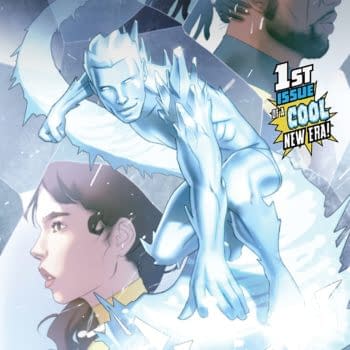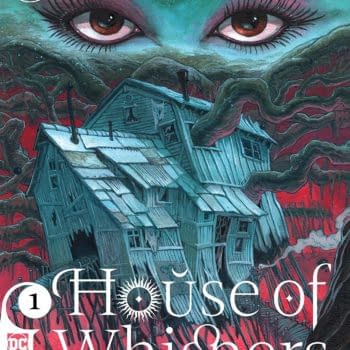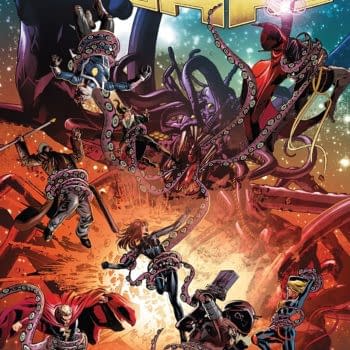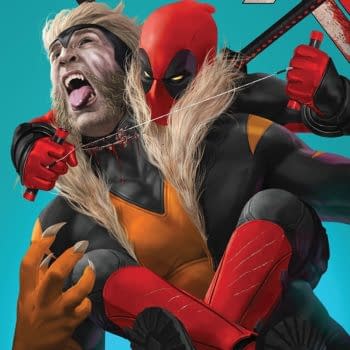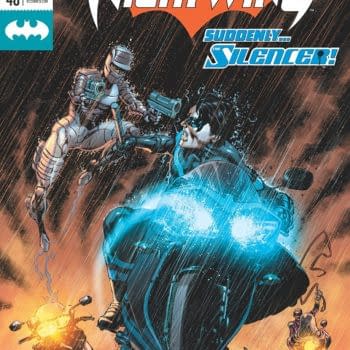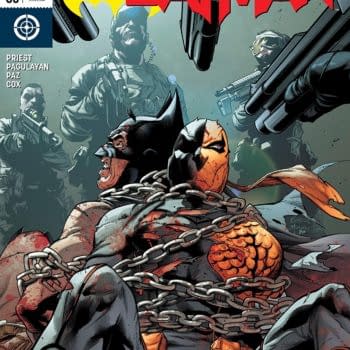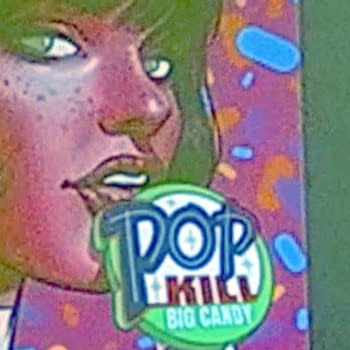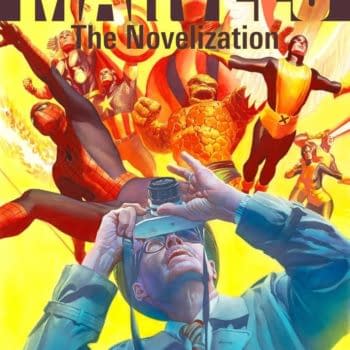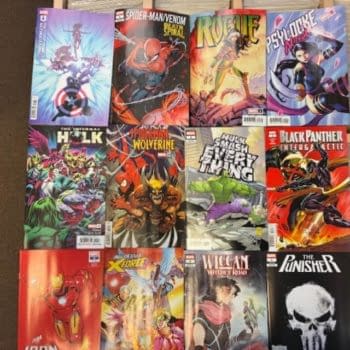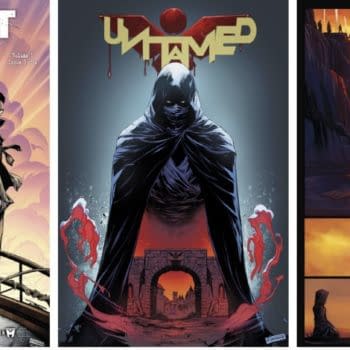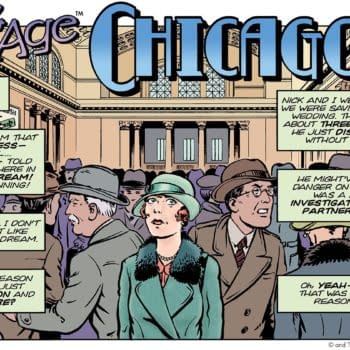Posted in: Comics, Marvel Comics | Tagged: black panther, jack kirby, Marvel Comics, T'Challa
Throwback Review: Black Panther Vol. 1 – It's Black Panther, It's Jack Kirby, 'Nuff Said
With the trailer for Ryan Coogler's Black Panther movie having just come out and looking absolutely awesome, let us travel back in time and take a look at King T'Challa's first series way back from 1977, written and drawn by none other than the King of Comics himself, Jack Kirby.
I won't lie, it's a weird one. Kirby, needless to say, had a boundless imagination. I know, who'd have thought it from the creator of the Fantastic Four, the X-Men, the Avengers, the New Gods, Etrigan the Demon, and, of course, Black Panther himself would have a mind like no other?
I actually read this not too long ago. I've been taking a trip down the annals of Black Panther, helped in part by Ta-Nehisi Coates' Black Panther and Black Panther and the Crew, Al Ewing's Ultimates, and Chadwick Boseman's excellent portrayal of T'Challa in Captain America: Civil War. After all of those, I haven't been able to get enough of the Black Panther, his intelligence, his devotion to his people, or his willingness to become ruthless should the situation call for it. He is easily one of the most interesting super heroes to ever come out of the Big Two.
The plot to this collection centers around Black Panther becoming mixed up in the affairs of a group of eccentric treasure hunters/collectors, namely the vicious Princess Zanda and Mr. Little, the latter of whom is indeed a little person. T'Challa and Little stumble across a time-traveling artifact called King Solomon's Frog. It's a small bejeweled brass frog that is also a time machine.
This is a weird one.
Also, every time something surprises Mr. Little, he says something space-related, like "Galloping Galaxies" and things like that.
Zanda tries to kill Little and Black Panther for it, and the fight accidentally activates the Frog, bringing forth the Six Million Year Man, a large-headed human from the future with power and intellect evolved far beyond what is possible for a person now. After he slays many of Zanda's men, they Panther and Little manage to incapacitate the Six Million Year Man, and they know they must send him back. However, they need the other Frog of King Solomon to do that. There's more than one. They don't have the technology, after all.
The trio take the sedated future man to the temple of King of Solomon to find the legendary other Frog, and, after many deadly trials, they find it and send the Six Million Year Man back home. Something, something, Steve Austin joke.
A guardian of the temple attacks T'Challa and the treasure hunters, and the structure begins to collapse. They manage to escape, but the collector compatriots of Zanda capture Black Panther and Little.
Threatening to actually nuke Wakanda, Zanda and the collectors coerce T'Challa to find the sacred water of a secret civilization of samurai, which apparently holds the key to immortality.
After fighting a frigging yeti and a guardian samurai, T'Challa and Little find the legendary civilization. The defeated guardian samurai wants the Panther to kill him to alleviate his shame, but, of course, the Black Panther is unwilling to follow through with this. While he tries to sort this issue out with the rulers of the hidden city of samurai, Little steals some of the water. This bungles things further, and the Panther manages to negotiate the return of the water to save their own lives.
The two return to the collectors. T'Challa calls Zanda's bluff, citing the dire consequences that she would face from the governments the world over. Little reveals that he had a smaller container full of the sacred water on his person. The collectors break into a brawl for the water, and its vial is broken. After this, T'Challa leaves for his home country.
There is a budding plot about a coup by a Wakandan general named Jakarra. This general exposes himself to raw vibranium, which causes him to seemingly disappear. In the growing crisis, a young royal named Joshua Itobo takes control of Wakanda while T'Challa is still out. This plot is not resolved in this collection, though.
This collection shows why the King is the King. Not many writers would have the capability or the moxie to put together a wild story like this. Eccentric and colorful collectors? Why not. A man from the year six-million? Sure. Twin brass frogs what are also time machines and belonged to the frigging biblical King Solomon? What the hell? Yetis, samurai, and mystic water; as an aspiring comic writer myself, I could only dream of putting tales like this together.
The visuals are astonishing. There are many talented artists in the scene that have tried to capture the spirit of Jack Kirby's art. While many of these artists have become fantastic artists in their own right, like John Romita Jr., the team of Didio and Giffen, and Mike Allred, none have quite completely remade the artistic style of Jack Kirby. That's a good thing by the way, because art is about what one can make, not what they can perfectly remake (the current state of Hollywood perfectly encapsulates the problem with constant remakes).
The various monsters and robots that Black Panther fights in this book are unlike anything I've ever seen before. The guardians of the temple of King Solomon, the Six Million Year Man, the Yeti, hell, even the monster that we see the Six Million Year Man fighting in his own timeline are instantly memorable. This is all helped by the vibrant and popping colorists who worked on this book, Dave Hunt, Petra Goldberg, Irene Vartanoff, and Sam Kato. They have been remastered for this collection and look absolutely fantastic.
The pacing is quite brisk. One thing that bogs down older comic books for me is the tendency to over-explain and give too much exposition. Kirby manages to sidestep this by giving us more visual information than textual (showing as opposed to telling). He still falls into the over-narration trap at times, but he does it far less than other celebrated writers from the time.
The action sequences are quite cool. There's a fair amount of futuristic laser bolts, martial arts action, and things getting blown up or crushed by giant creatures. It's an exciting read, to say the least.
If I were to come with some criticisms, which almost feels blasphemous, there are a couple that come to mind.
Black Panther himself almost feels like a vehicle for the story more than a character. He has a couple of moments of personality, but he almost seems to be an analogue for the audience that also manages to resolve the conflict.
Also, the "nuking Wakanda" threat by Princess Zanda kind of gets shrugged off and not resolved in a satisfying fashion.
"Hey Zanda, you're not gonna do this."
"Shit, you're right."
Problem solved.
Neither of these two problems are deal breakers, and the ride is so fun and strange that you're not likely to be too bothered by them.
This comic is easily recommendable. It's a classic. The art and colors are unlike anything you'll ever see. Jack Kirby is the King for a reason, and comics like this are the reason why.
The trade that I read was released way back in 2005. It may be a little hard to find now. I found a more recent reprint that has the same issues for over twice the price (thanks Marvel). I say track it down if you can find on sale, or, if you can find the original cheaper printing from 2005, all the better. It's well worth your time, especially if you want to explore the history of the King of Wakanda or the King of Comics.






